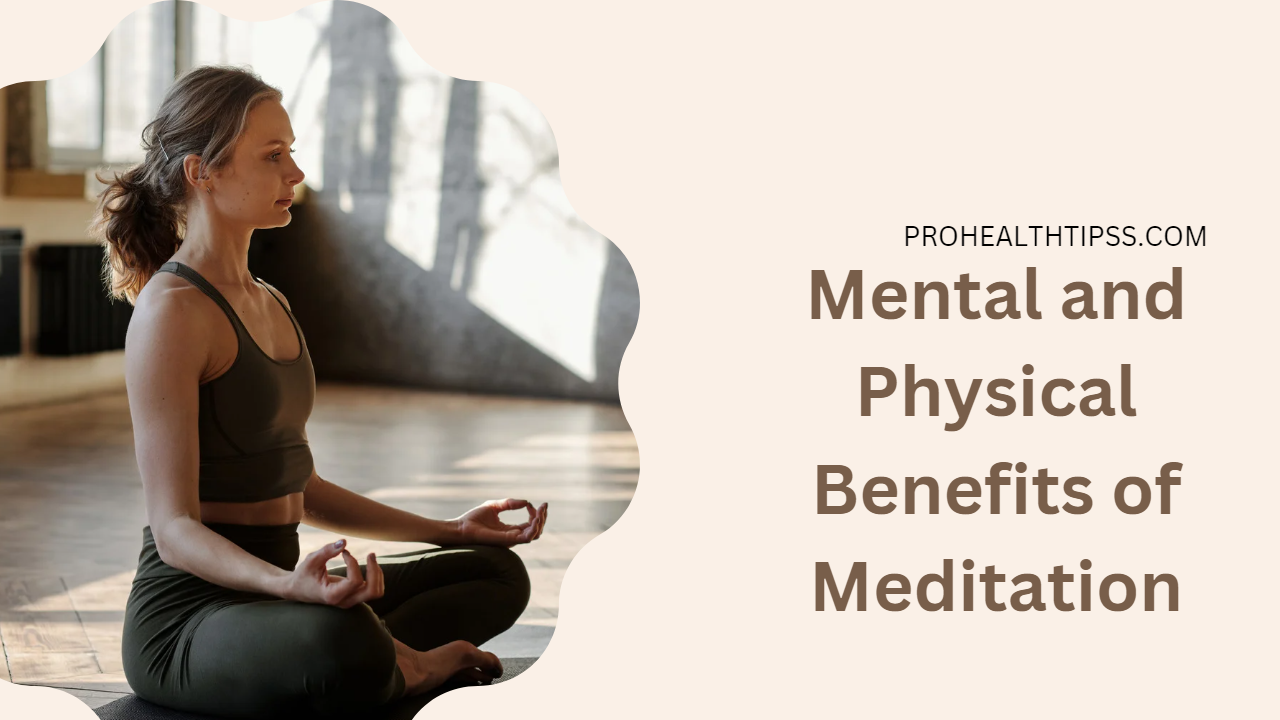Mental and Physical Benefits of Meditation
Meditation is a practice that offers a wide range Mental and Physical Benefits of Meditation, making it highly valuable for overall well-being. Regular engagement in meditation can lead to positive transformations in various aspects of life. On a mental level, meditation fosters a deep sense of inner tranquility and serenity. By directing your attention and calming the mind, meditation effectively diminishes stress, anxiety, and even symptoms of depression. It empowers individuals to develop a heightened awareness of their thoughts and emotions, thereby enhancing emotional resilience and facilitating more effective management of difficult circumstances.

There are Mental and Physical Benefits of Meditation:-
Stress Reduction:
Meditation offers valuable mental and physical benefits, with stress reduction being a prominent advantage. Engaging in meditation practices helps to calm the mind, alleviate stress, and promote a sense of inner peace. By focusing on the present moment and cultivating mindfulness, meditation enables individuals to better manage their thoughts and emotions, leading to improved mental well-being. Moreover, as stress often manifests physically, meditation’s stress-reducing effects can alleviate tension in the body, enhance relaxation, and contribute to better overall physical health. By incorporating meditation into their routine, individuals can experience the transformative power of stress reduction, positively impacting their mental and physical well-being.
Improved Focus and Concentration:
Improved focus and concentration are notable mental and physical benefits of meditation. Through regular practice, meditation enhances the ability to stay present and maintain mental clarity. By training the mind to focus on the present moment, distractions are minimized, leading to improved concentration abilities. This heightened focus not only benefits mental tasks such as studying or work but also enhances overall productivity. Moreover, the practice of meditation has been linked to physical changes in the brain, such as increased gray matter density in areas associated with attention and concentration. As a result, individuals who incorporate meditation into their daily routine can experience improved cognitive performance and a greater sense of mental sharpness.

Emotional Well-being:
Emotional well-being is a significant mental and physical benefit of meditation. Regular meditation practice cultivates self-awareness and emotional resilience. By observing and acknowledging emotions without judgment, individuals can develop a healthier relationship with their feelings. Meditation helps reduce reactivity to emotional triggers and promotes a greater sense of emotional balance and stability. This emotional regulation translates into improved overall well-being, as individuals gain a better understanding of themselves and their emotional responses.
Reduced Anxiety and Depression:
Reducing anxiety and depression is a significant mental and physical benefit of meditation. Studies have shown that regular meditation practice can help alleviate symptoms of anxiety and depression. By practicing mindfulness and focusing on the present moment, meditation cultivates a sense of calm and helps individuals break free from negative thought patterns. It provides a space for self-reflection, allowing individuals to gain insight into their emotions and develop healthier coping mechanisms. Furthermore, meditation promotes the release of feel-good neurotransmitters like serotonin and endorphins, which can contribute to a more positive mood and overall well-being.

Better Sleep Quality:
Better sleep quality is a notable Mental and Physical Benefit of Meditation. By incorporating meditation into their routine, individuals can experience improved sleep patterns and a more restful night’s sleep. Meditation helps relax the body and calm the mind, reducing racing thoughts and promoting a state of deep relaxation. By practicing mindfulness and letting go of stress and worries, individuals can create a peaceful environment for sleep. With consistent meditation practice, individuals may find it easier to fall asleep, experience fewer disruptions during the night, and wake up feeling refreshed and revitalized. Better sleep quality achieved through meditation contributes to enhanced mental clarity, increased energy levels, and improved overall physical well-being.
Lower Blood Pressure:
Lowering blood pressure is a significant mental and physical benefit of meditation. Regular meditation practice has been linked to a decrease in blood pressure levels, which is crucial for maintaining cardiovascular health. By inducing a state of deep relaxation, meditation helps reduce stress and anxiety, which are known contributors to high blood pressure. The practice of mindfulness during meditation promotes a calmer physiological state, leading to the dilation of blood vessels and improved blood flow. Over time, this can contribute to lower blood pressure readings. By incorporating meditation into their routine, individuals can experience the mental and physical benefits of reduced blood pressure, promoting a healthier cardiovascular system and overall well-being.
Boosted Immune System:
Boosting the immune system is a valuable Mental and Physical Benefit of Meditation. Regular meditation practice has been associated with a strengthened immune response. The reduction of stress through meditation plays a key role in this benefit, as chronic stress can suppress the immune system. By calming the mind and promoting relaxation, meditation helps to reduce the production of stress hormones and inflammatory markers. This, in turn, supports a healthier immune system, enhancing the body’s ability to fight off infections and illnesses. Moreover, studies have shown that meditation can increase the activity of natural killer cells, which play a vital role in immune defense.
Read more:-How Meditation has Changed My Life?
Pain Management:
Pain management is a significant Mental and Physical Benefit of Meditation. Regular meditation practice has been shown to help alleviate chronic pain. By focusing attention and cultivating mindfulness, meditation allows individuals to observe pain sensations without judgment or resistance. This shift in mindset can help reduce the perception of pain and provide a sense of relief. Moreover, meditation promotes relaxation and activates the body’s natural pain-relieving mechanisms. It helps to release tension, improve blood flow, and reduce inflammation, which can contribute to pain reduction. By incorporating meditation into their routine, individuals can experience the mental and physical benefits of improved pain management, leading to a better quality of life and overall well-being.

Increased Self-Awareness:
Increased self-awareness is a valuable mental and physical benefit of meditation. Regular meditation practice cultivates a deep understanding of oneself. By intentionally focusing attention on the present moment and observing thoughts, emotions, and bodily sensations, individuals develop a heightened sense of self-awareness. This awareness extends beyond the meditation practice and into daily life, enabling individuals to recognize patterns, triggers, and habits that may affect their mental and physical well-being. Increased self-awareness allows individuals to make conscious choices, respond to situations rather than react, and develop a greater sense of personal growth and self-acceptance. This mental and emotional introspection can lead to improved decision-making, enhanced relationships, and a more profound connection with oneself.
Overall Well-being:
Overall well-being is a comprehensive mental and physical benefit of meditation. The practice of meditation promotes a harmonious integration of the mind and body, leading to improved holistic health. By reducing stress, enhancing emotional well-being, increasing self-awareness, and improving cognitive function, meditation positively impacts mental health. It also has numerous physical benefits, including lowered blood pressure, boosted immune system, improved sleep quality, and pain management. These combined mental and physical benefits contribute to a greater sense of balance, inner peace, and fulfillment in life. By incorporating meditation into their daily routine, individuals can experience a holistic enhancement of their well-being, leading to a healthier and more satisfying life overall.




[…] Read More:–Mental and Physical Benefits of Meditation […]
[…] If you are know about more on Meditation,then definitely read this article Click Here […]
[…] a mindful surrender to the enveloping stillness that alleviates the hold of anxiety. Within this mental space, gratitude emerges as a guiding light, casting illumination on the positive aspects woven […]